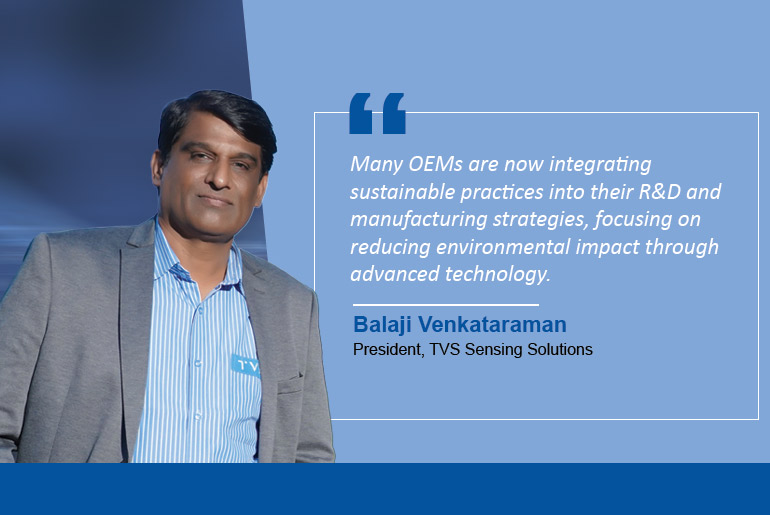India’s auto component sector is at the forefront of transforming mobility through innovation, sustainability and performance. As the electric vehicle segment gains momentum, the industry is shifting focus from traditional systems to electric and data-driven solutions. This transition demands for the development of advanced components like smart sensors, electric motors and ADAS (advanced driver-assistance systems) that deliver high energy efficiency, safety and durability, while minimizing environmental impact. This evolution is driven by focused investments in R&D, supportive government policies, localization and strategic industry collaborations.
India’s strength in software development, AI, and engineering talent has made it an emerging global R&D hub. Both global and domestic auto players are investing heavily in expanding their R&D capabilities to cater to evolving mobility needs in domestic and export markets. Innovation in auto component manufacturing is driving the making of intelligent, lightweight and high-performance systems for modern EVs. At the same time, sustainability efforts are focusing on eco-friendly materials, energy-efficient production and circular design practices. This growing emphasis on R&D is not only advancing innovation but also reinforcing India’s leadership in sustainable automotive solutions. As the sector evolves, R&D remains central to unlocking new opportunities and supporting long-term growth in the EV ecosystem.
EV Growth Through R&D
With rapid innovation reshaping the EV space, the auto component sector is evolving fast and India’s strong R&D capabilities are enabling manufacturers to develop advanced solutions that enhance performance, safety and user experience. R&D is essential in this transition to address the unique technical challenges posed by EVs ranging from energy efficiency and thermal management to compact design and real-time data integration. Focused research is needed to improve the reliability and functionality of critical components in EVs and hybrid vehicles, while also ensuring cost-effectiveness and sustainability.
R&D for EV auto components play a key role in developing modern systems such as energy-dense batteries, high-efficiency electric motors, intelligent sensors and robust vehicle control units. Manufacturers are dedicating their innovation efforts to creating components that offer seamless connectivity, predictive maintenance features and improved user experience. These advancements help drive the performance and scalability of EVs. Collaborations and strategic partnerships further amplify this innovation, enabling faster development cycles, global market reach and a competitive edge.
To support this evolving landscape, government-led initiatives such as the PLI scheme and FAME are providing a strong policy framework. These programs, along with tax incentives for R&D activities are designed to reduce the cost of innovation and encourage sustained investment in future-ready technologies. Additionally, state-level EV policies are leveraging India’s skilled tech and engineering talent to build a sustainable and future-ready automotive ecosystem.
Driving Sustainability: The Role of R&D in Innovation and Performance
Sustainability has become a core focus in the automotive industry due to growing concerns over climate change and environmental impact. As the sector shifts towards greener practices, R&D plays a vital role in developing new technologies and processes that enable sustainability while maintaining high performance. Circular economy models and smart mobility solutions offer both environmental and economic benefits, positioning sustainability as a key driver of innovation.
Many OEMs are now integrating sustainable practices into their R&D and manufacturing strategies, focusing on reducing environmental impact through advanced technology. This includes developing eco-friendly materials, energy-efficient production methods and improving end-of-life recycling systems. At the same time, manufacturers are prioritizing the production of sustainable auto components without compromising on performance. Transparency across supply chains ensures the efficient use of resources and verifies that every component created meets sustainability standards. R&D plays a crucial role in advancing sustainability by addressing environmental challenges and shaping a mobility ecosystem ready for the future.
Driving Towards the EV Future
EVs are bringing a major shift in India’s auto component sector with a stronger focus on innovation, sustainability and high-performance solutions. R&D is playing a vital role in this shift by enabling the development of advanced components that boost efficiency, safety, and durability while reducing environmental impact. Technology, modernization and advanced R&D capabilities are set to bring about a transformative impact on the future of the Indian auto component sector. With the growing adoption of electric and connected technologies, there is an increased focus on building sustainable, energy-efficient systems that meet global standards for clean and intelligent mobility. Achieving this will require ongoing innovation in design, sustainable materials and advanced manufacturing backed by robust R&D.
To accelerate EV adoption, the road ahead calls for cross-industry collaborations, higher R&D investments and stronger government support for charging infrastructure and supply chains. Simplifying policies and nurturing skilled talent will be key to scaling production and adoption. Localizing the manufacturing of critical components like batteries, motors and power electronics will also reduce costs and improve accessibility. By continuing to prioritize sustainability, innovation and performance, India is well on its way to leading the global shift towards cleaner and smarter mobility.

